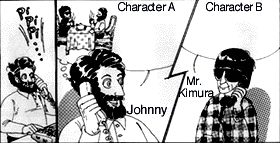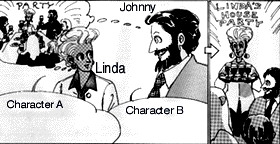|
|
EFL
Japan "a world of difference" |
|
|
|
||
|
Background to Step 6: Until this point in the learning process, students were encouraged to generate a large amount of language and to express themselves without concern for errors. However, it is about time we took a critical look at some of their usage and other mistakes. Stimu-Con Usage Games are designed to enable students to develop their ability in using socially acceptable American English through a format which not only makes conversational settings instantly clear to learners, but also makes it possible for them to choose the appropriate word, phrase, or sentence - as we do in everyday life. Teachers, furthermore, can monitor their students' conversational exchanges accurately in terms of pronunciation, intonation, grammar, and (mis)usage. |
| At this stage, the teacher has to decide how
s/he will explain to the students something as complex as American
conversational usage. Rather than attempt any explanation, I
always have students participate in these usage games and, in
no time at all, they have understood it. Let's use the picture-word format to reflect on the general situation of inviting/accepting (or what I call a communication function) in the following two usage games. If, for example, you're inviting your friend over to your place (Game 2), your language will be much different than when you're inviting someone to a house party (Game 3). |
|
|
||
| Conversational Focus Johnny would like to invite his friend Mr. Kimura to his place, so he's ... ジョニーは友人の木村さんを自宅に招きたいと思い・・・ |
Communication Function CharacterA / CharacterB Inviting someone (over to one's place) /Accepting (自宅へ)招待するには?/招待を受けるには? |
Character A / Character B 1. Wanna come over?/Sure. |
 |
||
|
|
||
| Conversational Focus Linda is telling Johnny that she is having a few friends over for dinner and would like him to come along with his family ... リンダがジョニーとその家族を自宅のパーティに招待しようとしている。 |
Communication Function CharacterA / CharacterB Inviting someone (to a house party) /Accepting (ハウスパーティに)招待するには?/招待を受けるには? |
Character A / Character B 1. Can you (guys) make it?/Yes, thanks. |
 |
||
| Note: For more examples of conversational functions, see Pragmatics and Conversational Usage. |
|
|
|
||||
|
|
|
|
|
|
|
|
|
|
||||
|
|
|
|
|
|
|
|
|
|||||
|
|
|
|
|
|
|
|
|
|
||||
|
|
|
|
|
||